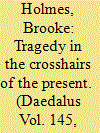| Srl | Item |
| 1 |
ID:
112865


|
|
|
|
|
| Publication |
2012.
|
| Summary/Abstract |
The meaning of Asia has changed drastically during the millennia the concept has been in use. Its usage was established in Greek literature 2,500 years ago as a geographic reference to lands inhabited by the Greeks at the Eastern side of the Aegean Sea. Over the ensuing centuries, Asia's Western boundary was extended to the rivers Don in the North and Nile in the South. At that time, it hardly contained any definite political or civilisational meanings. These were added to the concept in 1730 in a kind of Swedish-Russian cooperation when the Urals were redefined to form the boundary between Europe and Asia, the former starting to represent progress, and the latter its opposite. This situation has been gradually changing after World War II, when first definitions made in the United States, and later in East Asian countries have devalued the position of Europe and elevated that of Asia. Today, Asia is not a geographical concept. It is a political commonplace, used as a strong and positively loaded linguistic asset in political rhetoric in the Asian Pacific area for various kinds of regional integrative purposes.
|
|
|
|
|
|
|
|
|
|
|
|
|
|
|
|
| 2 |
ID:
144577


|
|
|
|
|
| Summary/Abstract |
A number of developments in the study of Greek literature over the past few decades have broken down boundaries of canon and genre, opening up a wide range of texts once deemed degenerate or unavailable to literary analysis, expanding the networks within which literary texts are interpreted, and bringing renewed attention to the reception of ancient texts in later periods up to the present. The rise of reception studies, in particular, raises new questions about how our own position within specific present moments not only imposes constraints on the interpretation of ancient texts but also enables it. In this essay, I survey these developments using Greek tragedy, the most canonical of genres, as a case study. I argue that we need to develop strategies of interpretation more attuned to resonances between contemporary quandaries and our extant tragedies while remaining committed to forms of social and historical difference. I pay particular attention to the problems of agency that tragedy raises at the juncture of the human and the nonhuman worlds.
|
|
|
|
|
|
|
|
|
|
|
|
|
|
|
|